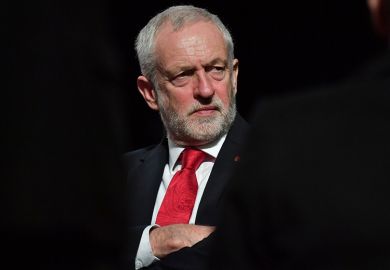Conservative priorities on English university policy for a general election manifesto or beyond will include targeting “low value higher education”, it has been suggested, as Tory ministers look set to reject the Augar review’s plans to lower tuition fees.
The independent panel for the review, led by Philip Augar, had recommended lowering the tuition fee cap from £9,250 to £7,500, with replacement public funding targeted towards subjects with the greatest “social and economic value” or highest costs.
Gavin Williamson, the education secretary, has said the government will respond to the review “before the end of winter”. However, some suggest that the government response could come in October and that, when it does arrive, it is likely to reject the tuition fees recommendation.
Jo Johnson, the former universities and science minister who resigned over Brexit last month, is said to have played a key role in cementing government scepticism about the Augar fees plan, during his six-week return to the brief.
Mr Johnson, a long-standing critic of Theresa May’s decision to establish the review, believed that the Treasury would be unwilling to replace the lost fee income and that the Augar plan would thus lead to cuts in university funding. He also warned that the proposed changes to student loan repayments would be regressive.
The new government, led by Boris Johnson, may also feel that a £7,500 fee policy would have little electoral impact when judged against Labour’s policy to abolish fees.
If the Augar fees recommendations are rejected before the next general election, which many expect to be held in November or December, that raises the question of what the Conservatives – who held their annual conference this week – would say on higher education funding in their election manifesto.
The thinktank Onward, regarded as increasingly influential on Tory thinking, has previously analysed graduate earnings data to spotlight what it terms “low value university degrees”.
Asked what the Tory manifesto priorities on higher education could be, Guy Miscampbell, senior research fellow at Onward, said: “When we do get movement on HE and fees, it will likely be [directed] to some of this wider concern about low value HE.”
He added: “There’s a recognition that there is a minority of universities that are not delivering the value that would be expected, either to students or to taxpayers…so I think any solution is going to have to reckon with that.”
The advent of Longitudinal Education Outcomes data, based on tax records, has brought new insights into the earnings of graduates on individual university courses. But many in the sector warn that in using the data, the government has failed to grasp the impact of student social background and regional labour markets in shaping the variation in earnings between different universities.
The Augar review included a focus on earnings data and said that “bearing down on low value HE” should be a priority for the government.
Mr Miscampbell suggested that “there may well be some thinking that starts to develop” around the universities “that are driving the cost of the system in terms of loans”, on “how you might link the core funding that they receive to the level of those expected write-offs”.
But he added that “finding a comprehensive answer to this question is going to be a much longer process”.
Register to continue
Why register?
- Registration is free and only takes a moment
- Once registered, you can read 3 articles a month
- Sign up for our newsletter
Subscribe
Or subscribe for unlimited access to:
- Unlimited access to news, views, insights & reviews
- Digital editions
- Digital access to THE’s university and college rankings analysis
Already registered or a current subscriber? Login








